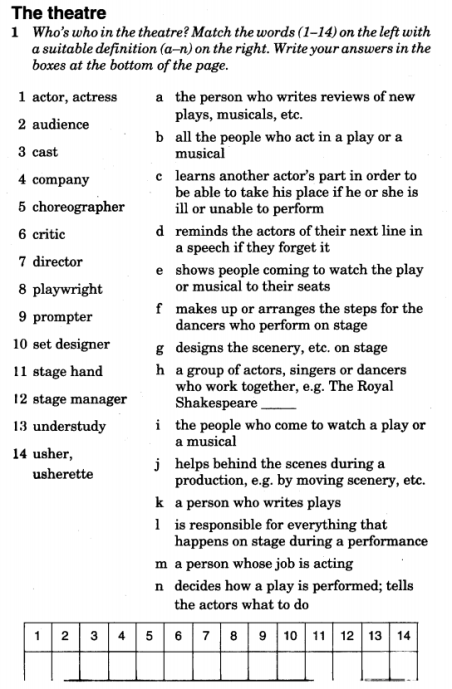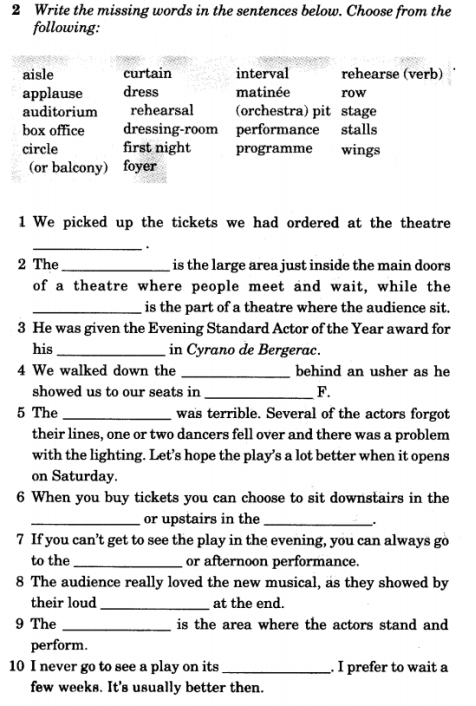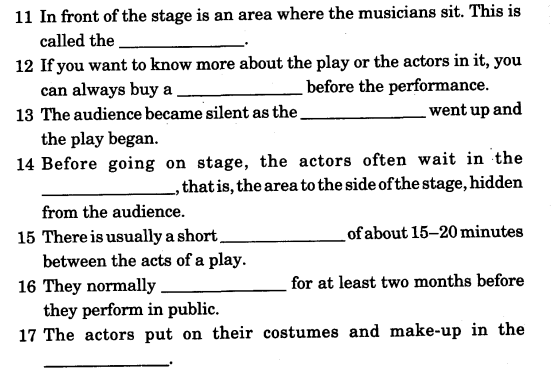Урок розробка уроку " Театр"
Topic: theatre
Learning goals: To teach the pupils:
- to recognize, understand and operate new words and word-combinations when listening, reading the text and doing exercises;
- to speak about theatre
- to break the ice and foster a safe environment for learning.
To develop skills of speaking and reading, listening
To teach pupils about the importance of art
To encourage pupils to use English creatively
Lesson
Topic: theatre
Learning goals: To teach the pupils:
- to recognize, understand and operate new words and word-combinations when listening, reading the text and doing exercises;
- to speak about theatre
- to break the ice and foster a safe environment for learning.
- To develop skills of speaking and reading, listening
- To teach pupils about the importance of art
- To encourage pupils to use English creatively
Materials and equipment: printed copies of the text, the set of handouts ,video, audio
Procedure of the lesson
I introduction
II main part
1 Vocabulary



2
Vocabulary Theatre and Drama
Match the words and their meaning
Words
The stage
The boards
The deck
The cellar
The props
The scenery or setting
The decor
Sound effects
Lighting effects
Main roles
Minor roles (“bit parts”)
To overplay
To underplay
To muff
To dry up
Stage directions
Soliloquy
An aside or stage whisper
Expository scene
Relief / recognition scene
The producer
Meaning
Small roles
Noises off (sounds like rain or thunder which produce a dramatic effect)
The space under the stage, mainly used for machinery
Various kinds of floodlights that can produce effects such as blackout
A scene in which a character discovers some important information which changes the course of events for him or for her
Played by the leading lady or man
Consists of the backcloth
To mispronounce the words or get the lines wrong
Monologue; this device allows us to discover the inner thoughts and motives of a character
Usually the first scene of a play
To act with too much restraint
Place where the actors play
Not just the setting, but also the props and costumes
The person responsible for directing the actors and deciding on interpretation
Synonym of stage
The stage floor
To forget one’s lines
To act in an exaggerated way
They give guidelines about stage effects or the character’s costumes, attitudes and gestures
When a character’s thought is expressed for the audience only
(Short for stage properties) The objects used by the actors, the furniture or carpets.
3 Video watching
Video-fragment - http://www.youtube.com/watch?v=m3VGa6Fp3zI
1. Write down whether the statements are True or False
|
1 |
The Globe was originally constructed in the sixteenth century. |
|
2 |
Women were participating in the performances from the very |
|
3 |
Usual performances took place at night because of expensive |
|
4 |
It was very easy to rebuild the theatre after the Great Fire of |
|
5 |
All plays in the theatre were mainly by Shakespeare. |
|
6 |
“Groundling” means the most expensive seats which are just under |
|
7 |
The top with the Zodiac signs represents heaven or the sky. |
|
8 |
The stage represents four different elements. |
2. Watch the fragment and fill in the gaps.
1) Its name is the ______________, which comes from the expression; everyone in
the world is an actor.
2) They would shout at the ____________________ and throw things at them if
they didn't like the play.
3) And also the church was very _________________ of theatre.
4) It called it the nest of the ________________ and it was usually just outside the
city walls because it wasn't really allowed in those days.
5) But there's great participation because the __________________ can see you,
the actors, everybody's involved in the play which makes kind of a difference from
the typical ____________ __________ play where everybody's in the dark.
3. Answer the questions proposed bellow.
1) What was the only reason of the day performances without any night ones?
2) Why were the groundlings throwing things at the actors?
3) What do three main elements of the stage represent?
Compiled by M.V. Kachur
Keys –
1. 1) F (the 17th century)
2) F
3) T
4) F
5) T
6) F (the cheapest one)
7) T
8) F (three)
2. 1) Globe
2) Actors
3) Critical
4) Devil
5) Audience, West End

про публікацію авторської розробки
Додати розробку
